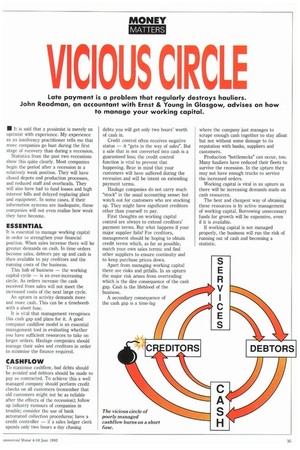VICIOUS CIRCLE
Page 37

If you've noticed an error in this article please click here to report it so we can fix it.
Late payment is a problem that regularly destroys hauliers.
John Readman, an accountant with Ernst & Young in Glasgow, advises on how to manage your working capital.
• It is said that a pessimist is merely an optimist with experience. My experience as an insolvency practitioner tells me that more companies go bust during the first stage of recovery than during a recession.
Statistics from the past two recessions show this quite clearly. Most companies begin the period after a recession in a relatively weak position. They will have closed depots and production processes, and reduced staff and overheads. They will also have had to fund losses and high interest bills and delayed replacing plant and equipment. In some cases, if their information systems are inadequate, these companies will not even realise how weak they have become.
ESSENTIAL It is essential to manage working capital in order to strengthen your financial position. When sales increase there will be greater demands on cash. In time orders become sales, debtors pay up and cash is then available to pay creditors and the running costs of the business.
This hub of business — the working capital cycle — is an ever-increasing circle. As orders increase the cash received from sales will not meet the increased costs of the next large cycle.
An upturn in activity demands more and more cash. This can be a timebomb with a short fuse.
It is vital that management recognises this cash gap and plans for it. A good computer cashflow model is an essential management tool in evaluating whether you have sufficient resources to take on larger orders. Haulage companies should manage their sales and creditors in order to minimise the finance required.
CASHFLOW
To maximise cashflow, bad debts should be avoided and debtors should be made to pay as contracted. To achieve this a well managed company should perform credit checks on all customers (remember that old customers might not be as reliable after the effects of the recession); follow up industry rumours of companies in trouble; consider the use of bank automated collection procedures; have a credit controller — if a sales ledger clerk spends only two hours a day chasing debts you will get only two hours' worth of cash in.
Credit control often receives negative status — it "gets in the way of sales". But a sale that is not converted into cash is a guaranteed loss; the credit control function is vital to prevent that happening. Bear in mind that your customers will have suffered during the recession and will be intent on extending payment terms.
Haulage companies do not carry much "stock" in the usual accounting sense: but watch out for customers who are stocking up. They might have significant creditors other than yourself to pay.
First thoughts on working capital control are always to extend creditors' payment terms. But what happens if your major supplier fails? For creditors, management should be hoping to obtain credit terms which, as far as possible, match your own sales terms; and find other suppliers to ensure continuity and to keep purchase prices down.
Apart from managing working capital there are risks and pitfalls. In an upturn the major risk arises from overtrading which is the dire consequence of the cash gap. Cash is the lifeblood of the business.
A secondary consequence of the cash gap is a time-lag where the company just manages to scrape enough cash together to stay afloat but not without some damage to its reputation with banks, suppliers and customers.
Production "bottlenecks" can occur, too. Many hauliers have reduced their fleets to survive the recession. In the upturn they may not have enough trucks to service the increased orders.
Working capital is vital in an upturn as there will be increasing demands made on cash resources.
The best and cheapest way of obtaining these resources is by active management of working capital. Borrowing unnecessary funds for growth will be expensive, even if it is available.
If working capital is not managed properly, the business will run the risk of running out of cash and becoming a statistic.














































































































